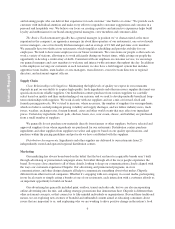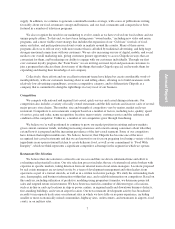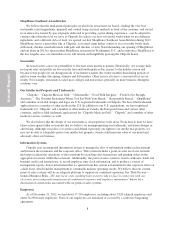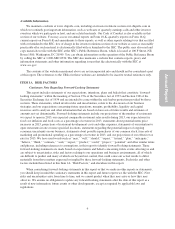Chipotle 2012 Annual Report Download - page 18
Download and view the complete annual report
Please find page 18 of the 2012 Chipotle annual report below. You can navigate through the pages in the report by either clicking on the pages listed below, or by using the keyword search tool below to find specific information within the annual report.
from our Food With Integrity suppliers and as described in more detail above, these suppliers could be more
difficult to replace if we were no longer able to rely on them. If we have to seek new suppliers and service
providers we may be subject to pricing or other terms less favorable than those we currently enjoy. If we cannot
replace or engage distributors or suppliers who meet our specifications in a short period of time, that could
increase our expenses and cause shortages of food and other items at our restaurants, which could cause a
restaurant to remove items from its menu. If that were to happen and customers change their dining habits as a
result, affected restaurants could experience significant reductions in sales during the shortage or thereafter. Our
focus on a limited menu would make the consequences of a shortage of a key ingredient more severe.
Changes in customer tastes and preferences, spending patterns and demographic trends could cause sales
to decline.
Changes in customer preferences, general economic conditions, discretionary spending priorities,
demographic trends, traffic patterns and the type, number and location of competing restaurants affect the
restaurant industry. Our sales could be impacted by changes in consumer preferences in response to dietary
concerns, including preferences regarding items such as calories, sodium, carbohydrates or fat. These changes
could result in consumers avoiding our menu items in favor of other foods. Our success also depends to a
significant extent on consumer confidence, which is influenced by general economic conditions and discretionary
income levels. Negative consumer sentiment has been reported to be impacting the economy to various degrees
since the economic crisis of 2008 and 2009, and according to some forecasts will continue to do so during 2013.
Our average restaurant sales may decline during economic downturns or periods of uncertainty, which can be
caused by various factors such as high unemployment, increasing taxes or other changes in fiscal or monetary
policy, high gasoline prices, declining home prices, tight credit markets or foreign political or economic unrest.
Any material decline in consumer confidence or a decline in family “food away from home” spending could
cause our sales, operating results, profits, business or financial condition to decline. If we fail to adapt to changes
in customer preferences and trends, we may lose customers and our sales may deteriorate.
If we were to experience widespread difficulty renewing existing leases on favorable terms, our revenue
or occupancy costs could be adversely affected.
We lease substantially all of the properties on which we operate restaurants, and some of our leases are due
for renewal or extension options in the next several years. Some leases are subject to renewal at fair market
value, which could involve substantial increases and a smaller number expire without any renewal option. While
we currently expect to pursue the renewal of substantially all of our expiring restaurant leases, any difficulty
renewing a significant number of such leases, or any substantial increase in rents associated with lease renewals,
could adversely impact us. If we have to close any restaurants due to difficulties in renewing leases, we would
lose revenue from the affected restaurants and may not be able to open suitable replacement restaurants.
Substantial increases in rents associated with lease renewals would increase our occupancy costs, reducing our
restaurant margins.
Regulatory and Legal Risks
Governmental regulation in one or more of the following areas may adversely affect our existing and
future operations and results, including by harming our ability to open new restaurants or increasing our
operating costs.
Employment and Immigration Regulations
We are subject to various federal and state laws governing our relationship with and other matters pertaining
to our employees, including wage and hour laws, requirements to provide meal and rest periods or other benefits,
family leave mandates, requirements regarding working conditions and accommodations to certain employees,
citizenship or work authorization and related requirements, insurance and workers’ compensation rules and anti-
discrimination laws. Complying with these rules subjects us to substantial expense and can be cumbersome, and
can also expose us to liabilities from claims for non-compliance. For example, a number of lawsuits have been
16
Annual Report
























